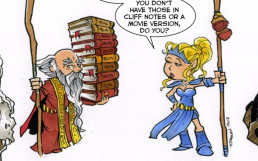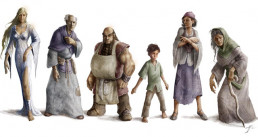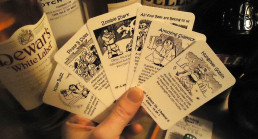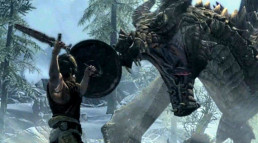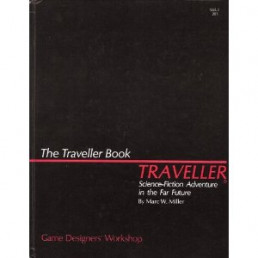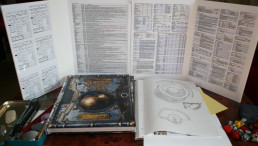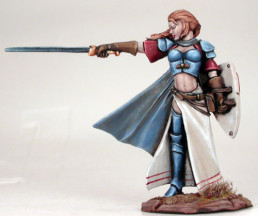Props in Tabletop Games
Utilizing props is one of my GMing trademarks. I think it is a great way to spice things up and keep a story interesting for the players. Whether it’s a one-shot or a campaign you have run for years, props can help the players immerse themselves more fully into the game world and make events more memorable.
However, before you add props to your game, ask yourself why you are doing it. Think about the type of game you are running. Are the players the type that would appreciate a little extra spice? Are they already roleplayers who may just need a little something extra to inspire them? If you have doubts, you might want to bring it up to them first. There are some types of players (*cough* min-maxers *cough*) that won’t appreciate your efforts. If you think your players would benefit from them, consider the setting and tone of your game. What type of props will best serve your needs?
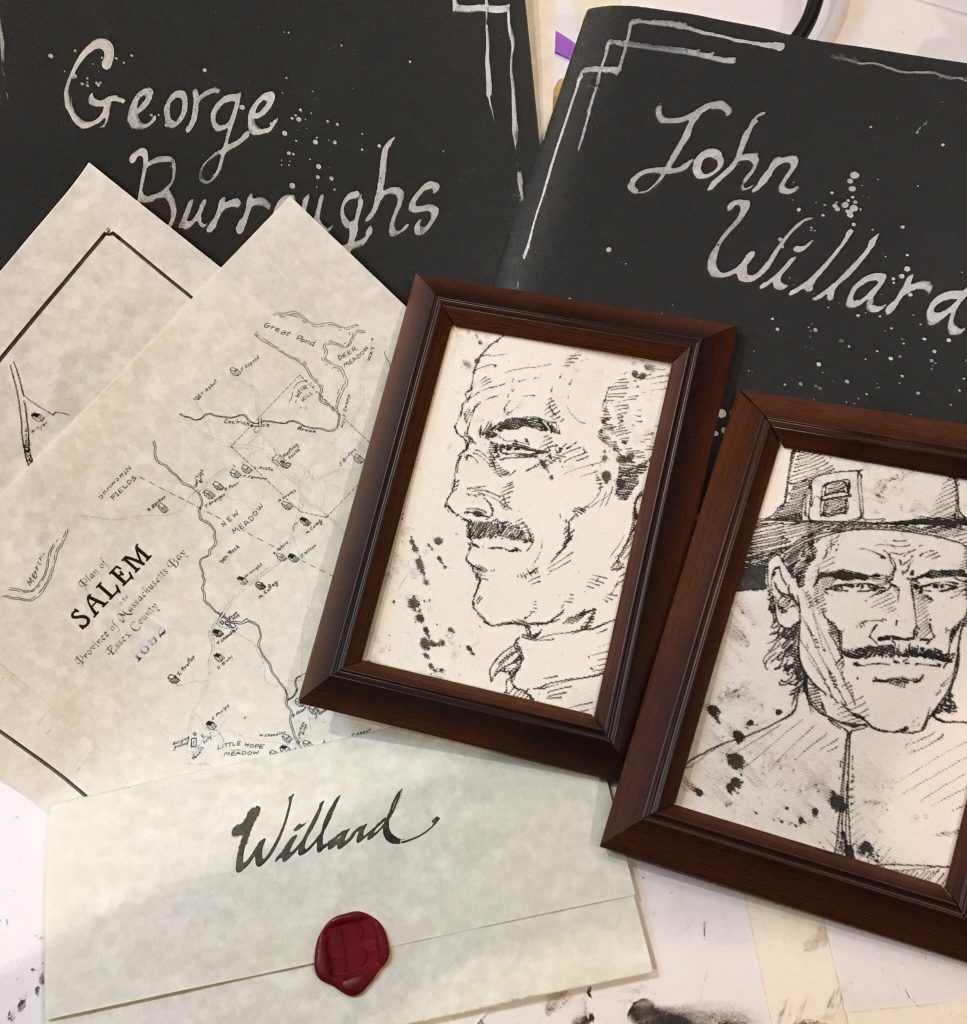 Items from the Story
Items from the Story
Prop items from the story are easily used by the GM to influence the game. The easiest to make are paper items that the characters need, such as maps, letters, paintings and photographs. When I ran a game set in the Salem Witch Trials, I created individual letters for each character that served as their motivation for teaming up to save their town. They also had maps of Salem on parchment paper. Having a contract or wanted poster in their hands immerses the players in the story. These props are really easy to make with the help of a computer and some parchment resume paper. There are a variety of simple methods for aging paper using common household items if you are running a historical or fantasy campaign. Sealing wax or ink stamps are a fantastic touch to finish off important documents.
Other items can also be used to move the story along and give the players information. Books, jewelry, crystals, potion bottles, and so much more! Use your imagination! I made wands and spell books for a Harry Potter game which kept the table lively and in character. It’s much more interesting for the players to study a real book for clues than to roll dice and have you describe what they notice. Once I used jewelry as a way for the party to identify each other as allies. It’s a great visual for them to reference during the game and then is a great souvenir for them after it is over.
Room Decorations
Decorating the table or your gaming room can be a great way to set a specific tone for your game session and it will help players get into character. I suggest starting with the lighting, because that will make the most difference to the vibe in the room. If your players are in a dungeon or if you are playing something like Vampire the Masquerade with a dark tone, turn down your overhead lights. Bring in some other light sources, like table lamps, so that the players can still read their character sheets. Buying colored light bulbs from your local hardware store is another great way to change up the look of a room without moving too much around.
Decorate your table too! We were delighted when one of our players brought candelabras for our Vampire game. They became such a staple of our game that when we couldn’t burn candles anymore, we replaced them with cheap battery powered ones from the Halloween store. Small things like this can give a campaign some unique character and can be fun for the players.
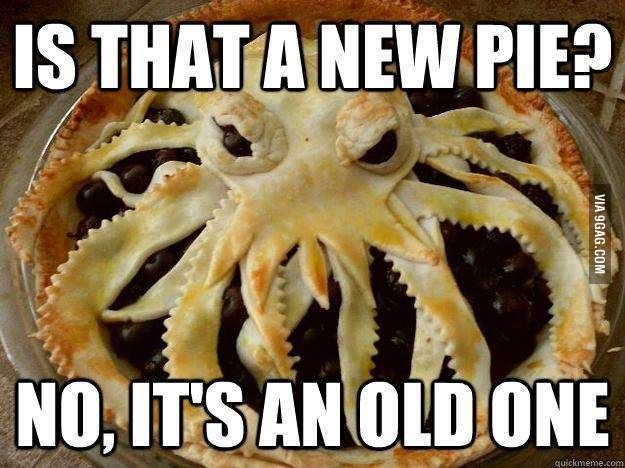 Food & Drinks
Food & Drinks
Providing themed refreshments makes the players very happy. It fills their bellies while also immersing them in the game world. The plates and cups you use to serve the food are also props. I often find myself holding my beverage of choice like my character would hold it, swishing or sipping a pewter mug or wine glass in character as well. There are many resources online with recipes from Star Wars, Lord of the Rings, Star Trek, A Song of Ice and Fire, and other fictional sources. Historical foods are also a great way to add to a campaign. I highly suggest that you test and taste a recipe before serving it to your gaming group!
Costumes
I love costumes, but I am not always a fan of them around the gaming table. Individual items, such as a hat or elf ears, can be a great addition and help a player stay in character. I suggest talking to your group and starting slow. Really consider how each costume piece will add to the game. Goggles or glasses can add a chance for in-character mannerisms, like nervously adjusting them or cleaning them when they are thinking about something. A longsword may be entertaining the first session, but eventually it will probably end up leaning against the wall and forgotten. Full costumes can get uncomfortable or distracting during a game. Plus, why wear a full costume when you only see each other from the table up? Don’t sacrifice comfort and fun to look the part. There are a number of online costume shops that can help find individual pieces for historical and fantasy games, as well as futuristic and science fiction games. I always suggest checking out your local thrift store or Goodwill before dropping a large amount of money online. I’ve put together whole costumes from second-hand stores. You never know what you will find!
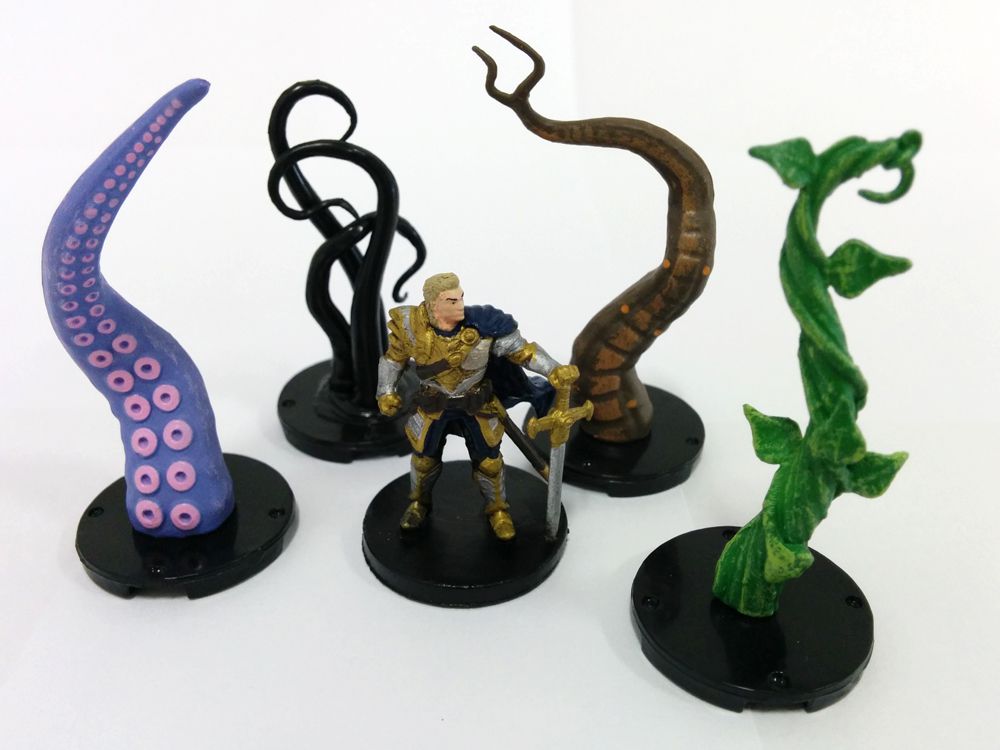 Miniatures
Miniatures
The most common prop in tabletop RPGs are minis. It’s easy to forget that these are props and that they really help with keeping the narrative clear for all the players. The Happy Jacks D&D campaign, Desert of Despair, really made me appreciate how much miniatures help the group visualize what is happening. Having actual spiders or giants to fight, instead of using paper clips or extra dice as stand-ins, can make a big difference. You don’t need to drop a fortune on specific minis for each combat, but using something that is about the right shape is always helpful. If you play D&D or other games that involve miniatures, consider building up a diverse collection of miniature foes for your players to face.
Once you decide that you want to add props to your game, choose carefully! Not all props are created equal! It’s better to add one perfect prop than to drop tons of stuff on the party that will detract from the game rather than add to it. Props will not save a bad game, but if you use them wisely, they can be a fantastic way to add a little dramatic flair to a game.
(This article was first released to Happy Jack's RPG Patreon supporters! Support our show for access to great previews and exclusive content!)
Creating Quality NPCs
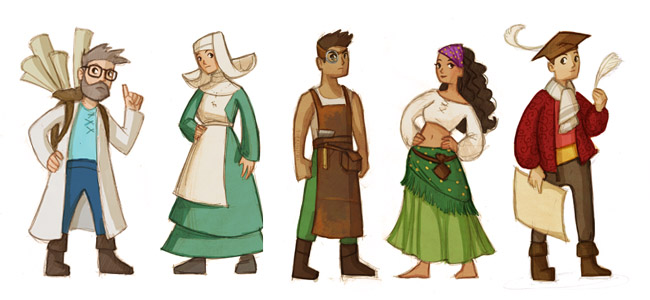 Planning for a game session takes a lot of time. The GM has to anticipate the actions of the players, and do their best to create a story that is challenging and enjoyable. There is a lot of pressure on the GM to create a lot of in-depth content, often with very little turn around time if the group plays multiple times a month. NPCs can be a particular challenge since there are usually a lot of them and players expect them to have personality and depth. So how can a GM create interesting NPCs without spending hours writing their backstories?
Planning for a game session takes a lot of time. The GM has to anticipate the actions of the players, and do their best to create a story that is challenging and enjoyable. There is a lot of pressure on the GM to create a lot of in-depth content, often with very little turn around time if the group plays multiple times a month. NPCs can be a particular challenge since there are usually a lot of them and players expect them to have personality and depth. So how can a GM create interesting NPCs without spending hours writing their backstories?
The fastest way to give an NPC depth is to skin them over a person or character with which you are already familiar. This trick is especially helpful when the party has gone somewhere unexpected and you have to create characters on the fly. It works with personalities that you know from real life, pop culture, literature, or anywhere else! It’s easy to give the fisherman’s wife personality if you model her after your crazy aunt, or to get the mayor to seem planned if you skin him over your favorite Disney villain. Have a list of NPC names ready, and it’s possible to fool the players into thinking that you planned it all ahead of time!
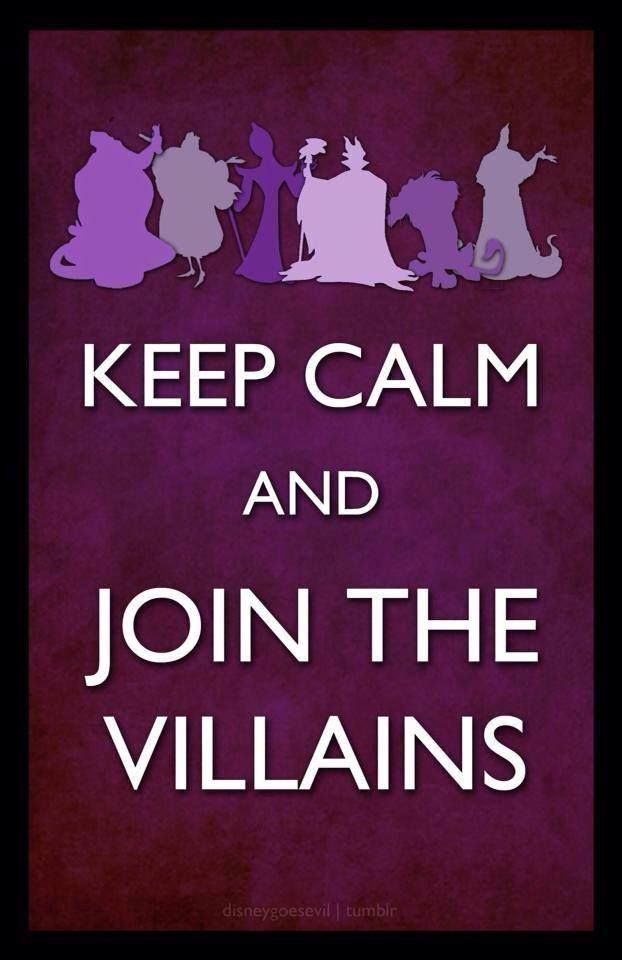 Connecting NPCs to characters you already have in the game is another way to add depth and backstory to them, without starting from scratch. By linking the NPCs to an existing character, a NPC or a PC, you give quick backstory and a frame of reference with which the players can judge them. The young girl they find in the forest ends up being the cousin of the farmer they rescued in the last session, or the town guard served in the military with one of the PCs. This is a great opportunity to bring the PC’s backstories into the game, even if it isn’t a major plot point. These causal connections help make your world feel more real and less episodic. As connections build between NPCs, and between PCs and NPCs, it creates a web that It can also throw some great curve balls at the party when they discover old acquaintances in unexpected places. It’s a great game moment when the party realizes that helping that NPC a few sessions back has unexpected benefits now, or the opposite if you are dealing with a band of murder-hobos!
Connecting NPCs to characters you already have in the game is another way to add depth and backstory to them, without starting from scratch. By linking the NPCs to an existing character, a NPC or a PC, you give quick backstory and a frame of reference with which the players can judge them. The young girl they find in the forest ends up being the cousin of the farmer they rescued in the last session, or the town guard served in the military with one of the PCs. This is a great opportunity to bring the PC’s backstories into the game, even if it isn’t a major plot point. These causal connections help make your world feel more real and less episodic. As connections build between NPCs, and between PCs and NPCs, it creates a web that It can also throw some great curve balls at the party when they discover old acquaintances in unexpected places. It’s a great game moment when the party realizes that helping that NPC a few sessions back has unexpected benefits now, or the opposite if you are dealing with a band of murder-hobos!
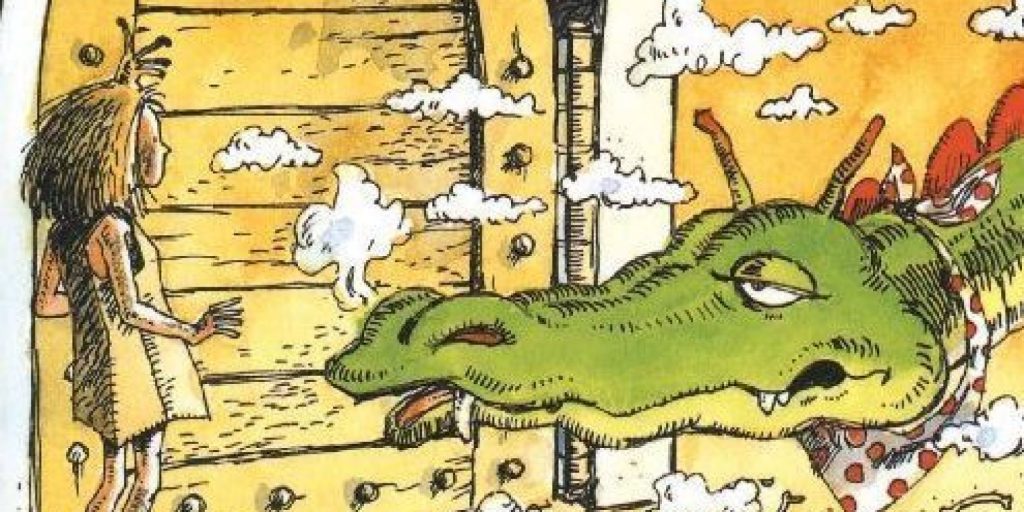 When you do take the time to create deep backstories for characters, it’s always more fun for the players if you avoid classic stereotypes. Not every wizard has to be Gandalf or Merlin. Not every princess has to be a damsel in distress. Make the princess a trained warrior who helps the party instead of waiting to be rescued from the tower. Maybe the wizard was trying to create an immortality spell and is now permanently an obnoxious teenager. NPCs should have disadvantages and flaws, just like any interesting PC. They should also have odd quirks that, although they don’t influence the story, make them unique in the world you have created. Odd collections of items, distinct clothing choices, physical mannerisms, and catchphrases are all great things to build into an NPC. If you are going to spend the time to create an important NPC from scratch, make them worth remembering!
When you do take the time to create deep backstories for characters, it’s always more fun for the players if you avoid classic stereotypes. Not every wizard has to be Gandalf or Merlin. Not every princess has to be a damsel in distress. Make the princess a trained warrior who helps the party instead of waiting to be rescued from the tower. Maybe the wizard was trying to create an immortality spell and is now permanently an obnoxious teenager. NPCs should have disadvantages and flaws, just like any interesting PC. They should also have odd quirks that, although they don’t influence the story, make them unique in the world you have created. Odd collections of items, distinct clothing choices, physical mannerisms, and catchphrases are all great things to build into an NPC. If you are going to spend the time to create an important NPC from scratch, make them worth remembering!
Complex supporting characters enrich the game world and present the group with opportunities for collaborative storytelling. GMs should see them as opportunities as exciting as any combat session. Challenge yourself to keep things fresh and your players guessing with the use of creative NPCs!
(This article was first released to Happy Jack's RPG Patreon supporters! Support our show for access to great previews and exclusive content!)
Review: Drinking Quest RPG
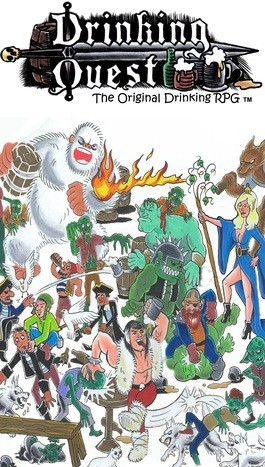 I take my gaming and my drinking very seriously. You have to when you're on a podcast with the tagline, "Pursuing the RPG Hobby with Reckless Abandon... and beer." Perhaps because of this, I was recently sent a review copy of Drinking Quest, an RPG card game designed to be played while drinking. In fact, the mechanics require you to be drinking.
I take my gaming and my drinking very seriously. You have to when you're on a podcast with the tagline, "Pursuing the RPG Hobby with Reckless Abandon... and beer." Perhaps because of this, I was recently sent a review copy of Drinking Quest, an RPG card game designed to be played while drinking. In fact, the mechanics require you to be drinking.
BEST CONCEPT EVER.
Drinking Quest is a very simple RPG by design, after all, they are expecting you to play while inebriated. The game is designed for two to four players. Everyone starts by choosing one of the four pre-generated character cards. These are all about equal power-wise, and have funny names and powers. I was a little disappointed that only one of the four characters is a very female character, but all the characters are very stereotypical to the point of being crude satire. The characters are really basic, with no armor, low stat numbers, and simple attacks. Again, I assume the designers were trying to keep the math simple for Drinky McDrinkerson and his buddies. After you kill off some enemies you can collect gold to buy some simple items to improve your defense or attacks.
There is no DM/GM, and each player draws a card to see what opponents or challenges they will 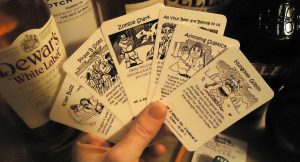 face. They player rolls against another player who represents the baddy if an opponent is drawn, or the player rolls all three dice if it's a stat challenge. Combats are simple and usually over in a few hits. It really reminds me of a simplified version of the DnD boardgames, like the Legend of Drizzt. It's a great little system that doesn't put responsibility on any one player. Everyone is able to just relax and enjoy themselves.
face. They player rolls against another player who represents the baddy if an opponent is drawn, or the player rolls all three dice if it's a stat challenge. Combats are simple and usually over in a few hits. It really reminds me of a simplified version of the DnD boardgames, like the Legend of Drizzt. It's a great little system that doesn't put responsibility on any one player. Everyone is able to just relax and enjoy themselves.
One thing that is lacking in Drinking Quest is a healing system. The game is designed to have your character die, then you chug your drink to get them alive and back to full health the next  turn. It sounds like it would be really fun, however it seems that characters almost never die in Drinking Quest. We played a few times and only a handful of chugging instances occurred. This seemed to be the main drinking component in the game, so we were a little disappointed that it happened so rarely.This isn't exactly a bad thing, especially if your just looking for something to play when your GM calls in sick, but if you're looking to get wasted this may not be your game. Try Beer Pong. My group ended up house ruling a healing mechanic that involved taking a big swig and getting a hit point back. (We just weren't getting drunk fast enough apparently!) This may only be a good idea if you are drinking beer, because a home brewed healing game with shots might kill someone.
turn. It sounds like it would be really fun, however it seems that characters almost never die in Drinking Quest. We played a few times and only a handful of chugging instances occurred. This seemed to be the main drinking component in the game, so we were a little disappointed that it happened so rarely.This isn't exactly a bad thing, especially if your just looking for something to play when your GM calls in sick, but if you're looking to get wasted this may not be your game. Try Beer Pong. My group ended up house ruling a healing mechanic that involved taking a big swig and getting a hit point back. (We just weren't getting drunk fast enough apparently!) This may only be a good idea if you are drinking beer, because a home brewed healing game with shots might kill someone.
The cards are clever and entertaining. They are some real zingers in there that will crack up the whole group. The challenges are amusing and it's nice that everything is drawn 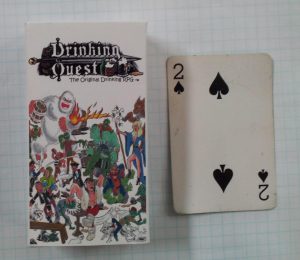 randomly so that every time you play the adventure changes. I was very worried about the "sexual prowess" stat when I first looked at the character cards, but it's used in an amusing and not a gross way (phew!). The artwork, by Carole Nelan, is well done and perfect for the feel of the game. It requires three dice, the game cards, and character sheets. The game is very high quality, with professional level cards, disposable character sheets on a pad, and a color printed box. The package design is excellent, and all of these items fit into a slightly larger playing card box. Seriously, I have both Drinking Quest and Drinking Quest 2 in my purse right now. I really appreciate that type of compact design in my games and gaming books.
randomly so that every time you play the adventure changes. I was very worried about the "sexual prowess" stat when I first looked at the character cards, but it's used in an amusing and not a gross way (phew!). The artwork, by Carole Nelan, is well done and perfect for the feel of the game. It requires three dice, the game cards, and character sheets. The game is very high quality, with professional level cards, disposable character sheets on a pad, and a color printed box. The package design is excellent, and all of these items fit into a slightly larger playing card box. Seriously, I have both Drinking Quest and Drinking Quest 2 in my purse right now. I really appreciate that type of compact design in my games and gaming books.
For $22 a pack the price is a little steep in my opinion. We had a good time with the game, and if you think you'd have the opportunity to play a lot, it could be worth the money to some gamers. If you will be playing with the same group over and over again, I'd suggest buying Drinking Quest 2 in addition to the original. It is a stand alone game, not an expansion, but you could mix up the adventures and PCs with the original Drinking Quest deck in order to keep things fresh. And, as always, I am fully behind home brewing the rules to customize the fun for your group.
You can learn more about drinking quest and buy it at drinkingquest.com. Please, drink responsibly... or crash on someone's couch.
Herding Dragons: My Wild Talents Con Game
 I love adding a unique twist to my convention games, and my Wild Talents game for Gateway 2012 was no exception. Months earlier I had been inspired to set my game in the world of Skyrim (mostly because I was playing it every waking moment), but I wanted to give my players a completely unique experience. A major role reversal was in order.
I love adding a unique twist to my convention games, and my Wild Talents game for Gateway 2012 was no exception. Months earlier I had been inspired to set my game in the world of Skyrim (mostly because I was playing it every waking moment), but I wanted to give my players a completely unique experience. A major role reversal was in order.
When my players arrived, they were greeted by my trademark gaming table. I've had other GMs scoff at my admittedly overdone layouts, but I 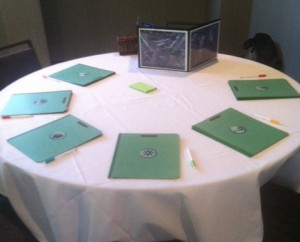 find that players really appreciate the amount of preparation and it starts everything on a very positive note. Folders were laid out on the table, each one labeled with a symbol that represented the character that lay within. I never let players see the character sheets before a game, so these symbols were the only clue they had to choose their folder. I find that this forces players out of their usual go-to roles and really ends up stretching their creativity during the game. It also negates the show-up-early-to-get-the-best-character strategy.
find that players really appreciate the amount of preparation and it starts everything on a very positive note. Folders were laid out on the table, each one labeled with a symbol that represented the character that lay within. I never let players see the character sheets before a game, so these symbols were the only clue they had to choose their folder. I find that this forces players out of their usual go-to roles and really ends up stretching their creativity during the game. It also negates the show-up-early-to-get-the-best-character strategy.
I gave a brief description of the setting, carefully avoiding giving away the big surprise I had in store for the players. Skyrim is a typical fantasy setting with a bit of Viking flavor thrown in for good measure. Wizards and warriors are commonplace, and dragons are the enemy of mankind. Many of my players were very familiar with the video game and had a very set image of what they were expecting from this game. Boy, were they in for a big surprise! After my explanation, I let them open their folders to see the portraits of their characters.
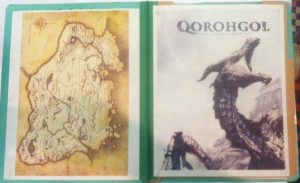 The reaction was amazing. The players were shocked, delighted, and a little thrown by the dragons that greeted them when they opened the folders. Each dragon had a unique "thu'um", a magical phrase in the language of the dragons, that gave them thier powers and the dragon's name was translated from Skyrim's dragon language to reflect their powers.
The reaction was amazing. The players were shocked, delighted, and a little thrown by the dragons that greeted them when they opened the folders. Each dragon had a unique "thu'um", a magical phrase in the language of the dragons, that gave them thier powers and the dragon's name was translated from Skyrim's dragon language to reflect their powers.
- Fendufyn, “The Devouring Bane”, was the biggest of the dragons and had a thu'um that turned his skin to stone.
- Qorohgol, “The Raging Lightning”, had skin that became electric, and electricity is VERY dangerous in Wild Talents.
- Haslovaas, “Song of Health”, was the most intelligent of the dragons, and had the ability to turn ethereal and heal through his thu'ums.
- Strunduving, “Storm-wing Devourer”, was the smallest and fastest of the brethren, with a thu'um that gave him super speed.
- Yolvolun, “Fiery Night”, was another of the bigger dragons and had a ranged thu'um that shot fire at any unlucky targets.
- Lizinjot, “The Icy Maw”, was designed as the counterpart to Yolvolun, with capable physical stats and an ranged ice thu'um.
I explained that they were young dragons who had hatched together, but had never seen any other dragons, including their parents.
One of my important GM strategies is to leave personality information off the character sheets. Yep, I don't tell them who they are. I specify important connections to other PCs (family relationships, similarities, past history, etc), list their stats and powers, but I let the player assemble all this information into their character's personality. Most players are totally thrown when they sit down at one of my convention games for the first time, but I find that it actually increases the role-playing at the table. Instead of forcing a square peg into the round hole I created, the player is able to form a peg they are comfortable with and that fits in the hole that the party creates. Players are incredibly creative and come up with great ideas that would never have occurred to me. This also increases the player's personal investment in their character and the game as a whole.
Now this game could have gone one of two ways. The choice that many players would have gone with would be the majestic, wise, and ancient dragon route. My players shunned that for the more quirky, Looney Tunes meets The Three Stooges style game. They decided they were all adolescent brother dragons and immediately started beating on each other and looking for girl dragons. Yep, they rolled initiative and started wrestling in true brotherly fashio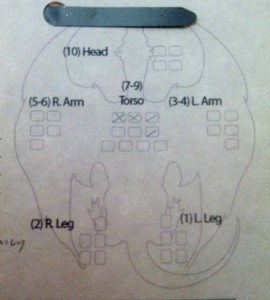 n. Although it was unplanned, it served as the perfect introduction to the Wild Talents combat system and really started the game off with a bang.
n. Although it was unplanned, it served as the perfect introduction to the Wild Talents combat system and really started the game off with a bang.
The Wild Talents system ended up being a perfect fit for this game. I was able to create powers that actually matched the dragon thu'um powers in Skyrim, as well as give the dragons stats that were appropriate for their species. It also worked to create the HUGE number of NPCs that the dragons eventually fought. WOW, do six teenage dragons plow through human NPCs! As always, the players ended up really enjoying the Wild Talents combat system. I did learn that I need to color code the NPS sheets for the next time a run an overpowered game like this, to make managing the large number of them easier! Better living through office supplies!!
As we moved through the story, I was absolutely floored by the level of role-playing in this game. My games are all very open, "sandbox" type worlds that encourage lots of role-playing and player empowerment, but this group took it to the next level. I was 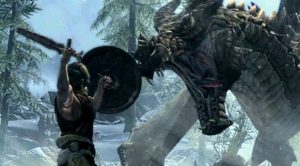 basically just along for the ride. Without pre-generated personalities to confine them, each player came up with an amazingly vibrant and unique personality for their adolescent dragon that matched perfectly with their stats and abilities. They fought with each other constantly (what else would teenage brother dragons do?), but were also very protective of one another when danger threatened. There was never a dull moment, and watching the players revel in being the dragons and not the bite-sized humans for once was a delight.
basically just along for the ride. Without pre-generated personalities to confine them, each player came up with an amazingly vibrant and unique personality for their adolescent dragon that matched perfectly with their stats and abilities. They fought with each other constantly (what else would teenage brother dragons do?), but were also very protective of one another when danger threatened. There was never a dull moment, and watching the players revel in being the dragons and not the bite-sized humans for once was a delight.
All the role-playing did take a lot of time though, and there is no time to waste in a convention game. Taking the advice of the Happy Jack's RPG podcast crew, I had designed my game in modules to provide more flexibility in the story. There were five total parts or scenes to the story. Scenes one and three were vital to the story, but scenes two and four could be skipped if we were running short on time. I had multiple plans and NPCs prepared for the finale (scene five) so that the scene could be quickly adjusted to fit the remaining time in our convention game. This high level of flexibility takes more prep time, but it allows the game to run seamlessly during the convention and lets the players resolve the game in the allotted time. It also allows the GM to run the game again and enjoy a completely different experience. Even with all the freedom the players had in this game we ended almost exactly on time.
I could tell the game was a huge success because everyone left the table as friends, and many of them were actually tweeting to each other in character for many days after. It was an amazing experience and I was truly honored that Fray, Stephen, Will, Kurt, Matt, and Sam all chose to be part of my game. They are incredible gamers and I hope to see them at my table many times in the future.
If you'd like to read the play-by-play of this game from a player's perspective, read Matt's blog post about the it at Monkey in the Cage.
System Spotlight: Traveller
Are you a fan of Firefly? Do you love the idea of gunslingers on the edge of civilized space? Traveller might be the game for you! In fact, Firefly is so similar to the Traveller universe that I would bet money that Joss has played in a campaign or two.
Traveller (yes, it's spelled like that) was first published in 1977 by Game Designers Workshop. It's a d6 system, but the dice mechanics vary slightly from edition to edition. I suggest the Mongoose version of Traveller, which is a 2d6 system where you usually want to roll high.
Originally, Traveller had no specific setting and was meant to be a generic system for all types science fiction gaming. It can still be used that way, but modern Traveller also has one of the most developed settings in the RPG world. There are THOUSANDS of complete star systems already designed and mapped out. People have not wasted time since 1977! Each of the tens of thousands of planets is planned out to include the important physical, social, and economic information about that planet. Check out travellermap.com for a fully functional map of the universe that can easily be used in your game.
 The Official Traveller Universe is the "Third Imperium", a human-dominated feudalistic society of worlds. Everything in the Empire is run by a class of nobles, but as you get farther and farther from the center of the Empire, things become less civilized and much more wild west! There are multiple races, but it is a human-centric game. The most interesting tidbit about the setting is that while ships can travel pretty quickly through systems, the center of the Empire is many months or even years away from some of the outlying systems... and communication cannot go faster than the ships. If you are out of range to contact someone via communicator, you have to send them a message via a courier ship, also known as an X-boat. This may seem like a big damper on the sci-fi aspect, but it adds so much to the game. This is what lets the outer reaches of the Empire be a pretty wild and lets your crew avoid arrest by staying one jump ahead of the arrest warrant, or make some good money if you end up on a good X-boat. (See? I told you it was like Firefly...)
The Official Traveller Universe is the "Third Imperium", a human-dominated feudalistic society of worlds. Everything in the Empire is run by a class of nobles, but as you get farther and farther from the center of the Empire, things become less civilized and much more wild west! There are multiple races, but it is a human-centric game. The most interesting tidbit about the setting is that while ships can travel pretty quickly through systems, the center of the Empire is many months or even years away from some of the outlying systems... and communication cannot go faster than the ships. If you are out of range to contact someone via communicator, you have to send them a message via a courier ship, also known as an X-boat. This may seem like a big damper on the sci-fi aspect, but it adds so much to the game. This is what lets the outer reaches of the Empire be a pretty wild and lets your crew avoid arrest by staying one jump ahead of the arrest warrant, or make some good money if you end up on a good X-boat. (See? I told you it was like Firefly...)
 Without a doubt, everyone's favorite thing about Traveller is the character creation system. The player gets to make choices during creation, but everything really comes down to die rolls. It's almost a separate game unto itself and gives players a skeletal back story for their character, including ties to other members of the party and skills they have learned along the way. The dice determine that you left military service with PTSD, but it's up to the player to flesh out the story. Are you devoted to another player because they saved your life? Do you hate the Navy for sending you to die? If you approach it with an open mind you can get an incredible character that you would never have created without the help of the dice.
Without a doubt, everyone's favorite thing about Traveller is the character creation system. The player gets to make choices during creation, but everything really comes down to die rolls. It's almost a separate game unto itself and gives players a skeletal back story for their character, including ties to other members of the party and skills they have learned along the way. The dice determine that you left military service with PTSD, but it's up to the player to flesh out the story. Are you devoted to another player because they saved your life? Do you hate the Navy for sending you to die? If you approach it with an open mind you can get an incredible character that you would never have created without the help of the dice.
The Traveller Core Rulebook is all you really need to run a game, although there are other Traveller books available if you end up wanting more options. Try it! It rocks!
(This article was originally posted on CharismaBonus.com)
Jumping into GMing

GameMASTER. The title itself has a way of excluding about half the population, and that fact is reflected in every game shop and on every convention floor. The number of female gamers may be rising, but the number of female GMs is still pathetically low by comparison. This has to change if we are going to continue to grow as a demographic.
GMing is something that every gamer should do at least once. It's an incredibly educational experience, and even if it doesn't end up being something that you stick with, you will be a better gamer for giving it a try. I was terrified the first time I ran a game, and consequently over prepped my game. It was a 4e game, based in a fantasy ocean world that I created called Nenesto. I had such a blast coming up with the NPCs, the cultures, and the challenges! I completely fell in love with the creative process and the power... THE POWER!! MWAHAHA... ahem. To date, I have run more than twice as many convention games as I have played in. Once the GMing bug bites, it doesn't let go, girls!
I have never run an adventure path or company published scenario for a group of players. I know that a lot of GMs start this way, and it can be very enjoyable. I've had a blast playing in many published campaigns, but I find that it is harder to run a game like that than just create my own world. No, I'm not crazy. Actually, I would argue that it would be easier for most people once they got over their fear of trying. Think back to when you were a kid. You had to study and practice the information that people gave you to learn, but you always could remember the smallest details about the stories, games, and worlds that you dreamed up yourself. It's much the same with self-created gaming worlds. I created the details of the world, so it's harder to forget them or mess them up... and if for some reason I do mess up, it's really easy for me to change to world to accommodate my mistake.
But how does one start to attempt such a daunting task as creating a game from scratch? First, you need to find a group of (kind) players. I was lucky enough to already have a gaming group that encouraged me to try GMing, but if you aren't so lucky, try recruiting friends and family members. Even if you end up running a game for two people who aren't gamers, it will be great practice and break the ice for you. Actually, running your first game for non-gamers has it's advantages. They are less likely to notice your mistakes, and you get a lot of practice explaining the system mechanics to them. I do not recommend running your first game for a group of strangers at a gaming store or convention, because you never know what type of players you will get.

After you have your players, pick your system. It should be a system that you are pretty familiar with, ideally one that you have played a lot. I recommend this because the more you know about the mechanics of a system, the easier it will be to tailor a good story around it and keep your game running smoothly. Have most of the basic combat and skill stuff memorized or on cheat sheets so you don't waste your players' game time looking stuff up. Cheat sheets are your friend! I'm convinced that's why the GM screen was originally invented. Another great trick is to have more obscure combat rules other important information marked so you can easily find it. Your mind will go blank at some point and it's great to be able to quickly find that info. My Wild Talents book is covered in multicolored sticky tabs for this very reason. Your players will appreciate your efficiency and be impressed that you are so prepared. Make no mistake, they will always do the one thing that you can't remember the mechanic for... darn players!
Step three, create your world based on something you know and love. Most likely the system you picked has errata with details about races, monsters, kingdoms/cities, etc. Feel free to use it or lose it. Don't feel that because you are running a DnD game that you HAVE to have dwarves, elves, and all the usual DnD suspects. Maybe your world only has humans, or maybe it takes place completely underground in the dwarven cities. It is YOUR world. Also, don't be afraid to go in a completely different direction than the game designers intended. One of the most successful games I have ever run was a Wild Talents game (a superhero system) about the Salem Witch Trials. The poor puritans started developing powers and panicked because they assumed it was the devil's work. What made it so great? I picked something I knew well and was passionate about. I'm a history teacher by day, and my love for the setting made the players equally passionate. You know your game is a success when they are standing up in the middle of a convention room yelling at each other completely in  character, and completely oblivious to the other games around them. It's those moments that I live for as a GM. Do you know everything about Tolkien's elves? Are you a huge Firefly fan? Could you write encyclopedias about vampires in your sleep? Those will be your most successful games. (This also comes in handy when you have a really knowledgeable player! One of my players for the Salem game had recently taken a class on the Witch Trials, so it was a good thing I knew my stuff!)
character, and completely oblivious to the other games around them. It's those moments that I live for as a GM. Do you know everything about Tolkien's elves? Are you a huge Firefly fan? Could you write encyclopedias about vampires in your sleep? Those will be your most successful games. (This also comes in handy when you have a really knowledgeable player! One of my players for the Salem game had recently taken a class on the Witch Trials, so it was a good thing I knew my stuff!)
After you have your system and your world imagined, start refining it into a (somewhat) linear plot. Just like writing stories, start with a basic outline and then slowly add in the details. For your first time, stick to a one-shot game that can be completed in four to six hours. Remember, the world that you created can be used again and again so all that prep isn't a waste for one game. Your adventuring party might save a specific kingdom from a demon, but there are many more kingdoms for them (or other players) to explore! Don't feel like you have to cram all of your creative material into one game. Keep it secret, keep it safe, then use it later.
I will be providing more helpful advice on GMing specific types of games in future posts, but the first step is always the hardest. Don't be afraid to "borrow" ideas from your favorite source material and realize that you will make mistakes, and that is ok! Be secure in the knowledge that EVERY GM screws up sometimes, and jump in with both feet.
(This article was originally posted on CharismaBonus.com)
Acquiring Accents for RPGs
 Accents are one of the most powerful tools in a role-player's arsenal. Using them can make characters stand out at the gaming table, and differentiate between in character and out of character comments. They can also be the difference between a good GM and an incredible GM who truly immerses players in their world. Why narrate a story? Bring out your inner thespian and BECOME your story.
Accents are one of the most powerful tools in a role-player's arsenal. Using them can make characters stand out at the gaming table, and differentiate between in character and out of character comments. They can also be the difference between a good GM and an incredible GM who truly immerses players in their world. Why narrate a story? Bring out your inner thespian and BECOME your story.
First of all, research whatever accent you'd like to try, or shop around for an accent that you can mimic fairly well. One of the best tools for listening to accents is the internet, specifically videos. Search for "regional dialect meme" on Youtube and you will get a ton of options from all over the world. This meme is particularly helpful because it includes many words and sounds, but it also includes regional terms. For example, is it "soda" or "pop"? These terms can be awesome little details to add to your characters and really unify a group of characters that are from the same place.
Remember, it's ok if you aren't perfect at first, and you really will get better as you go. Hell, it's an RPG! Unless you are playing a historical game, who's to say your accent isn't perfect? Maybe the people from that land over the mountains sound exactly like your bad Jamaican accent. There are a large number of Russian/Irish accented characters in my games... who start to sound more Irish as I drink. Go fig.

Accents are regional, not racial. In a recent season of the Happy Jack's RPG Podcast, another host started speaking like a southern character from one of our games. The character was named Windy Drawers, and he was a sloppy, overeating, unintelligent politician. We instantly started receiving angry emails from people who were upset that we were depicting such an unflattering African American stereotype on our show, however we had never mentioned Windy Drawers' race on that episode of the podcast. In our game he was actually a rich southern white man, but listeners drew their own conclusions based on their own racial stereotypes. Let me say it again, accents are regional, not racial. They are determined by where you grew up and lived, not by your ethnicity or species.
This is a very important distinction that is often overlooked in gaming... and in the media. The stereotypical dwarf may have a Scottish accent, but if he was raised by elves (oh, the horror!) he will sound more like an elf than his dwarf kinsmen. Humans from different parts of the world should have different accents, and drow should not sound like surface elves... unless they were raised together! A good player or GM will use this in their games. An NPC shows up claiming to be from a local town, but speaks differently than everyone there... clue #1 for the party. Maybe it's your half-elf's first adventure with this band and you're getting to know them along the way? Your Irish/British/Russian/common accent tells them that you were raised by the human side of the family, not the elves. They add depth and complexity to a character instantly, that could only otherwise come from sharing written back stories or long in-game explanations.
Here are some easy tips for mastering an accent:
- Find a phrase that will immediately bring you back into your accent. Usually, this is something very stereotypical that you almost can't imagine being said in any other accent. For my Irish accent I use the phrase "Jesus, Mary, and Joseph!" because it's VERY Irish, and it's easy to fit into many different situations. It's like hitting the refresh button on my Irish lilt.
- Listen to your chosen accent as much as possible. Watch Braveheart 4 more times, or whatever movie has the accent you are trying to mimic. Audio books are also a great option since they are easy to get and reasonably priced. The more you hear the accent the easier it will be for you to imagine it in your head later when you are trying to use it.
- Practice! The more you use your accent, the better it will sound. Talk along with your favorite movie character with that accent, repeat commercials on the radio or read street signs while you're driving in the car. I practice in the car a lot because nobody can hear how awful I sound.
- Anticipate what words you are going to use a lot in the campaign and practice them extra! For example, if you are a German spy in a pulp game, you might be dealing with lots of military equipment, location names, etc. You will probably never have to use the words "elf", "dwarf", or "dragon", so stick to what you'll need. Bonus points for learning and using regional terms or words from their native language!
- Did I mention that you should practice? Seriously, do it. You don't want your first try at an accent to be while you're sitting at the gaming table. Trust me on this, I learned this the hard way.
Hollywood & Heroes Charity Event
![]() The Emerald Knights comic and game shop is hosting a huge event this Sat, June 9th from 12pm to 7pm. The event supports the Shriner's Hospital for Children, so join us for the fun and some good karma. It will be a day of games, signings, photo opps, and much more! Lots of geek-famous actors will be there, including members of The Guild, and over 40 cosplayers, including myself! There are also items being auctioned off on the EK auction page.
The Emerald Knights comic and game shop is hosting a huge event this Sat, June 9th from 12pm to 7pm. The event supports the Shriner's Hospital for Children, so join us for the fun and some good karma. It will be a day of games, signings, photo opps, and much more! Lots of geek-famous actors will be there, including members of The Guild, and over 40 cosplayers, including myself! There are also items being auctioned off on the EK auction page.
I will be dressed as Wonder Woman all afternoon. I will also be playing in some RPGs, spreading word about the Happy Jack's RPG podcast, posing for pictures, and visiting with everyone. Rumor has it that I may also be running a DC themed Wild Talents game...
I hope to see a lot of familiar faces on Saturday! More info can be found on the Emerald Knights website, or by contacting the shop.
RPG Podcast Listener Survey
 The 2012 RPG Podcast Lister Survey is up! Please visit rpgpolls.com to fill it out. This information is very useful to podcast hosts and gives great information on the demographics of our audience members. It should take you less than 5 minutes to fill out and doesn't ask for any personal contact information.
The 2012 RPG Podcast Lister Survey is up! Please visit rpgpolls.com to fill it out. This information is very useful to podcast hosts and gives great information on the demographics of our audience members. It should take you less than 5 minutes to fill out and doesn't ask for any personal contact information.
The 2011 survey gave us some very interesting information about RPG podcast listeners. According to last year's statistics, RPG podcast listeners are between the ages of 26 and 29. 51% of them are married and over 66% use iTunes to download their podcasts. D&D was still the most popular gaming system of listeners, but had dropped 2.3% while other systems such as Savage Worlds and GURPS gained ground. Overall, listeners spent an average of $621.92 on RPGs and gaming in 2011. Women made up only 6% of respondents in last years survey, however the actual number of women who took the survey increased.
Happy Jacks RPG Podcast did very well in the 2011 survey. Over 27% of the gamers surveyed listened to our podcast!! We actually ranked 3rd in the list of top 20 RPG podcasts! Most surprising of all, Happy Jack's was the favorite RPG podcast of women who took the survey. Over 33% of the women who completed the survey listened to our podcast! This makes me very happy, since I am a huge proponent of women in gaming.
I am eagerly looking forward to the results of the 2012 survey! Please share this info with your gamer friends! The more respondents, the more accurate the data will be!
Thou Shalt Not Play with Assholes
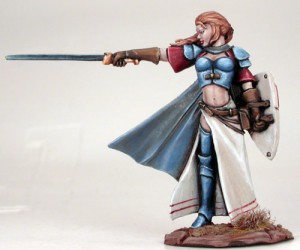 Should subjective tabletop RPG rules be eliminated since they can allow the GM's biases to influence the game?
Should subjective tabletop RPG rules be eliminated since they can allow the GM's biases to influence the game?
This rather hot topic has arisen lately, especially regarding mechanics where the GM can reward players for their role-playing. This discussion was started by site called Gaming for Women and we recently discussed it on an episode of the Happy Jack's RPG podcast.
While misogynistic behavior was the main concern of the article, any time you allow the human element into activities it opens the door for prejudice. I will be the first to admit that this can lead to horrible situations in games and in gaming groups. However, I argue that this subjectivity is imperative to gaming and especially vital with reward mechanics. The human element is the reason we play tabletop games. Otherwise, we'd all just go play video games since they are available whenever we want and don't drink all the beer when they come over. I have seen reward mechanics bring quiet role-players out of their shell and bring games to a whole new level. If a numbers mechanic regulated the use of rewards, rather than the GM, the same people would always get the bennies! Only the subjective judgement of a GM can evaluate the amount of effort a player is putting into the game.
Some people (read: self-proclaimed feminists) chimed in on my twitter feed and claimed that women may need all subjective rules to be eliminated in order to insure total fairness in all gaming groups. WTF? Seriously? I cannot begin to describe how insulted I was by the idea that women need rules to protect them in RPGs. If you are in a group where you need rules to protect you from a GM's vindictive actions, get the fuck out of there! We play games FOR FUN! If you are playing with people who treat you unfairly based on your gender, race, religion, sexual orientation, beer preference, or anything else, it isn't going to be fun. Nobody should ever stay in any type of relationship (romantic, friendly, gaming, or otherwise) where the only thing protecting them from abuse is rules. Being empowered includes the power to remove yourself from a bad situation. Find another group, or start checking out online gaming options if the pickings are slim in your area.
Remember Kimi's golden rule of gaming: thou shalt not play with assholes!
